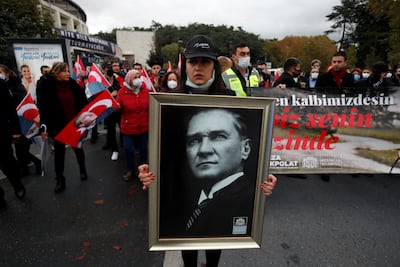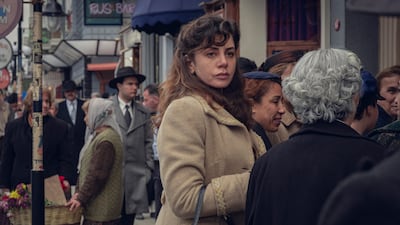In 1950s Istanbul, Matilda Aseo is released from prison as part of a general amnesty, 17 years after committing a mysterious murder, and faces a decision: leave Turkey for a new life in Israel, or stay and raise Rashel, the now-teenage daughter to whom she gave birth after entering prison and placed in an orphanage.
The choice is made for her when Rashel gets caught breaking into a nightclub to help out a friend. At the urging of Club Istanbul manager Celebi, Matilda, who was raised in a wealthy Jewish home, accepts the club’s washerwoman job to pay off her daughter’s debt.
So begins Netflix’s new Turkish series The Club, which has drawn praise for its affectionate depiction of Istanbul’s Jews. They celebrate Shabbat and Purim and touch their door-affixed mezuzahs, pieces of parchment contained in decorative cases and inscribed with Hebrew verses from the Torah. They also sing and speak in Ladino, the Spanish-influenced language of Sephardic Jews who emigrated to the Ottoman Empire from the late 15th century.
Several Turkish Jews consulted on the series, providing insight on Ladino, traditional songs and cultural and religious practices. Gabi Behiri, a Sephardic Jew born and raised in Turkey, said Turkish Jews had always been portrayed through an anti-Semitic lens. “For the first time in Turkish TV history, I saw myself in a TV series,” Mr Behiri said on Twitter last week. “Some details were so gracefully placed,” he added, “that I watched the same scenes over and over with amazement.”
After taking Arab countries by storm more than a decade ago, Turkish dramas – or “dizi” – are today a global phenomenon, with more than 700 million viewers in nearly 150 countries, according to state-run Anadolu Agency. Back in 2008, the final episode of Noor on Saudi broadcaster MBC drew 85 million Arab-speaking viewers. By 2012, some 97 per cent of Iraqis were watching Turkish dramas, according to a report from the Turkish Economic and Social Studies Foundation, though the number of Arab viewers has declined since 2018, after Saudi, Egyptian and other broadcasters banned Turkish productions.
Turkey then expanded its target audience. Today dizis are hugely popular across South America, where locals can watch up to 10 Turkish series a day, according to Anadolu Agency. Eternal Love, the first Turkish show to win an International Emmy, last year broke audience records on US-based Spanish-language station Univision. Bride of Istanbul, the previous series from The Club director Zeynep Gunay Tan, received a rapturous welcome in Israel in 2018, spurring the creation of a dedicated TV station, a parody on a leading sketch show and a live production at one of Tel Aviv’s largest concert venues.
The wide appeal is unsurprising. Dizis tend to be high-quality productions that tell stories of family and tradition while depicting luxury in the modern age. They must pass muster with Turkey’s censorship board, which means no scenes that might be considered obscene or immoral. Last year, Pakistan Prime Minister Imran Khan gave his seal of approval to Resurrection: Ertugrul, which drew big audiences in his country, saying it depicted a “life with values".


This explains why the shows are seen as a source of soft power, boosting Turkish influence abroad. If The Club has any political agenda, it may be targeting a familiar foe of Turkey’s ruling AKP. While purportedly embracing the secular democracy of the West, Turkey’s founder Mustafa Kemal Ataturk also advocated Turkish nationalism and sought to advance Turks and Turkishness via a process known as Turkification.
Thus, the Greek-Turkish population exchange of 1923, the public push to speak Turkish – rather than Greek, Kurdish or Ladino – and a series of anti-minority measures adopted in the republic’s first decades. The last of them provides The Club with its inciting incident. Turkey’s 1942-imposed wealth tax gave minorities a month to pay taxes up to 20 times higher than those of Muslim Turks.
The stated reason was to raise funds for Turkey’s entry into the Second World War, but the move clearly sought to shift economic might from non-Muslims to Muslims. In The Club, young Matilda is betrayed by her Muslim lover, who works for her father’s shipping firm yet hands his boss to the authorities for failing to pay the tax. Like 2,000 non-Muslims in real-life Turkey, Matilda’s father and brother are taken to a labour camp, where they perish.
Meanwhile, a handsome, well-groomed taxi driver named Ismet seems to represent Ataturk’s cosmopolitan, West-embracing White Turks, while a gentle and thoughtful worker from the provinces could be a stand-in for the conservative Black Turks who drove the country’s urbanisation and later the rise of the AKP. Ismet dates multiple women, including Rashel, drinks alcohol in the street, and just before smacking Rashel in the face, tells her that family is the disease of the century. “Once you fall into that pit, you won’t ever get out,” he warns.

Arriving in Istanbul, the provincial Turk is reluctant to work in a club that serves alcohol. But after Celebi, the Club Istanbul manager, forces Matilda to work through Shabbat, it is the provincial Turk who appears to remind her that “God forgives” and help her with the cleaning. Later, he compares Sephardic Jews’ arrival in Anatolia to the arrival of Turks a few centuries prior.
The Club is set in 1955, and appears to be inching towards the horrifying real-life pogrom against Greeks, Jews and Armenians that occurred in the same area, around Galata Tower and Istiklal Caddesi, in September of that year. It could thus be read as an indictment of the founder, and an anti-Ataturk stance is to some extent baked into the AKP, which was inspired by the country’s leading, anti-secular Islamists.
In 2013, Turkish President Recep Tayyip Erdogan described Turkey’s law on alcohol consumption as “made by two drunks” – a likely reference to Ataturk and his right-hand man Ismet Inonu, who were known to tipple. Last week, on the 73rd anniversary of Ataturk’s death, which was the result of cirrhosis, leading Islamist outlet Yeni Akit appeared to troll the still-revered founder with an article on cirrhosis and the dangers of alcohol. Now comes this series, which looks set to further question Ataturk’s legacy while portraying minorities warmly and putting conservative Turks in a positive light.
Netflix is expected to release the four-episode second season soon. As the first season closed, Rashel sought to get as far as possible from Ismet, departing for Israel with her fellow Jewish betrothed Mordo. Orhan, the secretly Greek owner of Club Istanbul, had just reviewed the list of minority employees to be dismissed so he could qualify as Turkish entrepreneur of the year. “The country is changing,” he says. “Non-Muslims will have to accept it.”


